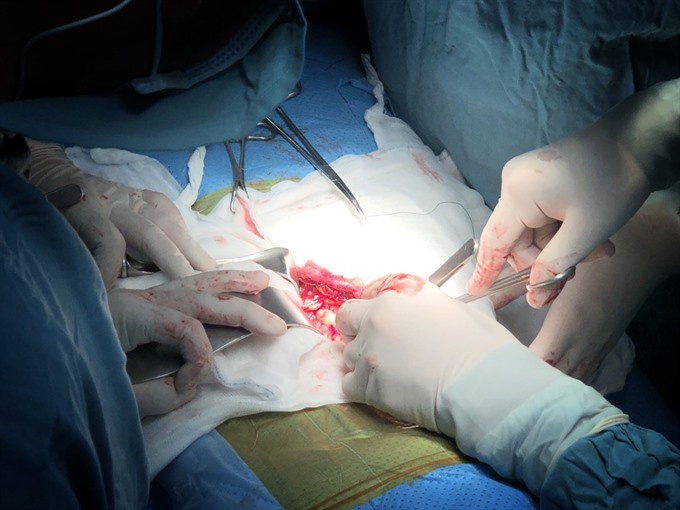 Society
Society

Doctors have performed a successful kidney transplant on a 15-year-old boy with kidney failure at Pediatrics Hospital No.2 in HCM City, the country’s first organ transplant on a child using a donated kidney from a brain-dead adult.
 |
| Doctors at Pediatrics Hospital No 2 perform the country’s first organ transplant on a child with a kidney donated from a brain-dead adult. Doctors at Chợ Rẫy Hospital in HCM City assisted the surgery. — Photo courtesy of Pediatrics Hospital No 2 |
HCM CITY — Doctors have performed a successful kidney transplant on a 15-year-old boy with kidney failure at Pediatrics Hospital No2 in HCM City, the country’s first organ transplant on a child using a donated kidney from a brain-dead adult.
The boy from Lâm Đồng Province has been treated for last-stage kidney failure since February at Pediatrics Hospital No 2, doctors announced yesterday.
On December 9, Pediatrics Hospital No 2 was notified by the National Coordination Centre for Organ Transplants that a donated kidney from a 43-year-old brain-dead man was available, Trịnh Hữu Tùng, director of the Pediatrics Hospital No 2, said.
Doctors at Pediatrics Hospital No2 informed patients on the hospital’s kidney-transplant waiting list to arrange a number of tests immediately so the hospital could choose an appropriate recipient and gather a surgery team, Tùng said at a press meeting held yesterday.
At 4pm on December 12, the donated kidney was transported from Việt Đức Hospital in Hà Nội to the Pediatrics Hospital No 2, and surgery began at 9pm on the same day.
The six-hour life-saving surgery was performed with medical assistance from doctors at Chợ Rẫy Hospital in HCM City.
The boy, whose health condition is now stable, will be able to return to school after six months, doctors said.
“My family is very grateful to the organ donor and his family for a new and better life for my son,” Nguyễn Thị Tâm, the boy’s mother, said.
Pediatrics Hospital No 2 has performed 18 kidney transplant operations, including 17 from living donors. The operation on the boy was the first transplant that used a kidney from a brain-dead donor.
In mid-October, Chợ Rẫy Hospital, Thống Nhất Hospital and Paediatrics Hospital No 2 signed an agreement to collaborate in the allocation of donated kidneys for transplant operations on children if there is a brain-dead or non-heart-beating donor. The collaboration gives priority to child patients, Tùng said. — VNS




